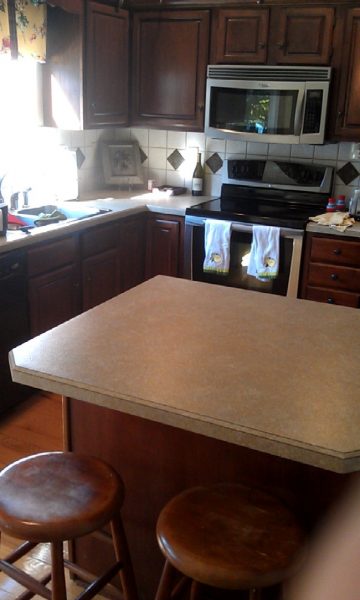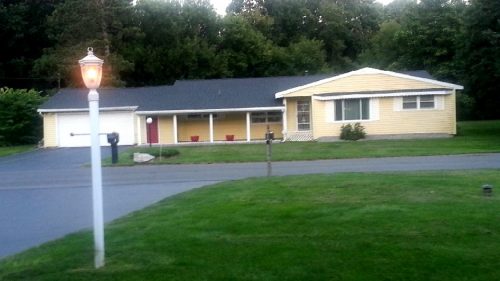This is something a little different. Last year we published an article titled Should You Buy A House?. The housing market has been up and down, depending on which side of the fence you’re on. If you were trying to sell a home, things were going well for close to a year; even now they’re not bad. If you were a buyer, prices went up drastically and there was a lot of competition.

Things are starting to move back towards how they were before the pandemic hit in many areas of the country, including the central New York area. Even with an erratic market, there are always rules that potential home buyers should know, especially if they’re first time buyers. This is geared towards that demographic, but we feel there’s something for everyone here. Let’s take a look at our 10 things we feel you should know or at least think about.
1. Why do you want a house?
This is a very important question you need to ask yourself, or that you and your significant other should discuss. The process of trying to find the right house or having one built can be very tiring and stressful. You don’t want to put yourself through it if you’re not really interested in buying one.
Many people are content with apartment living; probably all of us lived in apartments at one time or another. When a couple starts getting close to deciding on a long term commitment with each other, home ownership starts to sound like a good idea. It might be, or it might not be.
Don’t buy a house because someone tells you it’s a great investment; that statement’s not true unless you’re buying a million dollar house or if you’re living in a large city community where the worth of houses are always increasing. Even if your house appreciates in value over the years, you’ve probably put more money into the house that, along with paying your mortgage, will end up with you taking a loss. We’re not saying don’t do it; we’re just asking you to consider your options, both short and long term, before you do it.
2. Can you afford to buy a house?
Wanting to buy a house and being able to afford one are two different things. Here’s a couple of dirty little secrets that you might not hear anywhere else.
The first secret is that the first realtor you visit to see how much house you can afford might give you a figure that you really can’t afford. Even if you can pay for the mortgage, first time home owners almost always have to pay escrow as verification that there’s going to be enough money to pay property taxes.
We talked to a client who, when he and his wife initially met with a realtor in discussing the possibility of buying a new house, he did some calculations and said they could afford to buy a house as much as $275,000. At the time, their combined income was around $75,000 a year. If they only had to pay the mortgage they could have afforded it, though it’s possible that at certain times the money might get tight. With escrow, they’d have been in major trouble within a couple of years because there was no way their income was going to grow enough on a yearly basis to keep up with the payments. Even with a fixed rate for the house, property taxes almost always go up on a yearly basis, which means your monthly payment goes up to cover it.

The easiest way to estimate if you can afford an house is to take what you’re paying for rent and double that. Once you’ve done that, look at what you’re paying for your utilities and, unless they’re included in your rent already, double that also. All your other normal bills will pretty much stay the same, so looking at that initial figure will give you a quick idea of the kind of money you might need to pay for a house you’ll like. Never let anyone talk you into going house poor.
By the way, to be fair, some of this will depend on how much you can put down up front, and how energy efficient the house you buy happens to be. That will lower your payments some, a lot if you can put down 50% up front.
3. Be prepared to look at a lot of houses.
If you think you’re going to look at only 3 or 4 houses and find the perfect one, it’s probably not going to happen. Not only do you sometimes look at upwards of 15 to 20 hours over the course of years (yes, we said years), but unless you build your house it’s rare that you’ll find everything you want in a house.
The problem is that it’s hard to tell a realtor what you actually want if you don’t have real experience in explaining what you want in a home or aren’t sure what you want. Do you want wooden floors? How many bedrooms? How much square footage? A ranch or two-story? Home office? Laundry room? A two-car garage? Is there anything you’re willing to give up if you have everything except that one item on your list?
You might also end up going through different realtors; you might even eventually find your new home on our own by going online. Many people look at a bunch of houses because each one has a different design once you’re inside. You can always change appliances if you have the money for it; you can’t always decide after the fact that you want your bedroom to be 15×19 but it’s presently only 12×12 and you’re not prepared to pay for someone to break down a wall and either expand it into another room or have an addition built onto the house.
You won’t believe how tiring house hunting can be. You’ll be drained from the searching, even though when you first start out it feels exciting. You also won’t be seeing a house a day… be thankful for that.
4. Other than price, your most important preference should be neighborhood.
Having an idea of where you’d like to live is a big deal. It’s also important to share that with your realtor up front. often, realtors will take you to see houses that don’t fit what you want in a neighborhood. Unless you’ve lived in an area long enough and have driven around on your own looking at them, you might be shocked to see a nice house in a bad neighborhood or a bad house in a nice neighborhood. Realtors will look for what you ask them to look for; without extra details, you could be going to places you never counted on (that’s when you start getting tired of looking at houses).

If you have kids, you’re going to want to know what the schools are like. You might want to know how close you are to grocery stores or restaurants. You might want to live closer to people or be fairly secluded. Do you want to live on a dead end street or a cul-de-sac? Do you want to live in a full development or one where there’s lots of land where new houses will be built? Quiet or busy street? Parks, places to walk or bike, rivers or lakes, entertainment… it’s all about quality of life. True, you can drive anywhere if you have a car, but if you have a lot of what you want in your neighborhood you’re going to enjoy life more.
5. You’re going to need even more money after you move in.
This is the point alluded to up in #1. It’s the one point that most people either never think about or underestimate how much they’re going to need or want to have.
For most homes, even an extra $15,000 to spend once we moved into your house won’t be close to enough. A pre-existing house seems to have everything you need and want. As you’re moving in, you start to realize that not only are there things that need to be done, there’s a lot of things you’ll need to purchase.
It’s possible that you’ll need more things in the house or newer things. You might need to do a lot of maintenance on things that the inspector didn’t either bring up fully, didn’t explain how much those things might cost to repair, or didn’t check (inspectors don’t often test appliances like dishwashers or washing machines).
Even if you were told you’re going to need a new roof, if you don’t price that up front you might suffer sticker shock. You might have to or want to paint every room in the house. If anything was left in the house that you decide you don’t want, you might have to hire someone to come get the old stuff or even hire people to clean areas that you didn’t check beforehand (like basement cubbies that a lot of people ignore).
You might decide to cut down trees you feel are too close to the house or are rotting. You might need to bring in an electrician if your inspector pointed something out, or if you discover something once you try using certain items in the house. In other words, there are many things that you’ll never pick up on when you’re going through someone else’s house, your inspector doesn’t always look at everything, and your realtor also might not know about.
You might fare better if you have your house built from scratch, but recognize that will cost you more money than buying a pre-existing home. At least you’ll get to select all of your own appliances, and you’ll probably not need to spend a lot of money once you move in, but your costs will be much higher across the board. Are you thinking about staying in that apartment now?
6. Don’t get pushed into buying a house if you’re not feeling it.
Realtors in general are taught that many of their clients will suffer from what’s known as “buyer’s remorse”, so they’ll work hard to encourage you to buy a house that you might have some hesitations on. Stick with your feelings because a home investment is not only costly, but it’s a long deal, the longest arrangement you’ll ever enter into other than marriage.

One of our clients told her now the realtor loved the house for them, so they found themselves hours later sitting with her and the real estate lawyer she had in her office getting ready to sign papers to buy it. That is… until he looked at his wife and said he wasn’t sure he liked the house. His wife said the same thing, and the shock on the face of their realtor and the lawyer almost made both of them laugh. That takes a lot of courage, but never buy anything you don’t feel fully invested it.
7. Make sure you send in your own inspector and make sure you understand what they’re telling you about a property.
Realtors will recommend inspectors for you. We’re not saying that they’ve got a cozy relationship with each other, but sometimes you’ll do better finding your own. Once you do that, when they give you a report make sure you ask them what they mean by some of the things they say. This is something touched upon in point #5.
Often they won’t give a red mark to something specific, but they’ll indicate something that’s less than being totally positive. Those types of things could end up costing you a lot of money later on, so it’s best to know up front what’s going on. Don’t ever be afraid to ask questions, and keep asking for more details; remember, buying a house can be a long term deal.
By the way, we don’t want to make all realtors look greedy and incompetent. There are many who are very good and diligent in doing their jobs. As with your home search, you should ask for recommendations on realtors from your friends or online reviews. You’re going to want to find someone you feel comfortable with; you might end up spending a lot of time with them.
8. Even with disclosure laws, you might not hear about every problem a house has.
A homeowner might not tell you that the roof leaked during a major rain storm, especially if it doesn’t leak every time it rains. The same goes for flooding in the basement. They might not tell you about the nasty habits of their pets or that the heating ducts might not be sealed properly. You might not know that the water heater or furnace are on their last legs. It’s possible that many of the appliances are ready to die (these are things your inspector might not check).
If you ask a lot of questions and get false answers, which you’d know later on, if you document everything you’ve been told, you’ll have earned some rights of protection. Sometimes you might have leverage to either get some things repaired before you move in or you can dicker for a reduction on the cost of the house. If you don’t ask questions, it’s all on you.
9. Know your own credit report and credit score.
Even if you’ve been approved for a loan by a realtor, the mortgage interest rate you qualify for might not be up to snuff because of your credit rating. Lenders still use things like credit scores, and if yours isn’t up to their standards (which sometimes happens to people with good credit but no recognized action towards obtaining more credit even if your payment history is solid) and you might not get that wonderful low mortgage interest rate you’ve been hearing about if they’re worried about your credit viability.
If you know what your credit is like and it’s not top notch, you can always put more down on your home to get a better interest rate. The caveat is that if you’re credit rating isn’t all that good then you might not have the money to put down up front in the first place. This part takes you back to point #2; can you really afford a home?
10. Even if you’re having a house built, make sure you have everything agreed upon down on paper.
When the parents of another client decided to have their house built years ago, they were dealing with a salesperson that ended up having a bad reputation they didn’t know about. Lucikly, his parents weren’t the trusting sort.
The salesperson promised his mother a lot of things and she made him write them all down. When the company learned about the kind of salesperson he was and fired him, then met with his parents and said they couldn’t get all the things he’d promised them. His mother produced the paper that he’d signed guaranteeing all those things she had asked for and she got them, much to their dismay; since he’d been an employee of theirs at the time. As Judge Judy used to say, if it isn’t written down it didn’t happen.
Considering buying a home needs to be taken seriously. Unless you’re extremely rich, don’t just dream for what you want. Put the early work in, research, ask questions, vet people who are going to work with you, then get ready for the real work. If you do it right, you won’t end up dealing with a lot of problems and issues later on.

